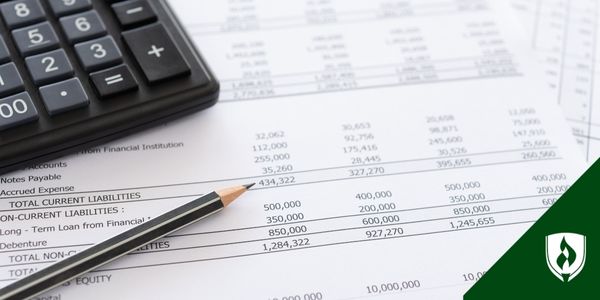What Can You Do With an Accounting Degree?
01/14/2026

Have you ever wondered how businesses keep track of their money, how financial decisions are made, or what goes into making sure a company stays compliant with tax laws and regulations? If so, pursuing an accounting degree might be worth exploring.
Accounting involves more than numbers, it’s about interpreting financial data to support strategic decisions. With a degree in accounting1, some common responsibilities may include reviewing financial statements, conducting audits, assessing costs, or contributing to risk management.
Types of Accounting Degree Programs
Rasmussen University offers several accounting degree programs2 designed to meet students where they are, whether you’re just starting out or building on previous college credits. These programs typically cover accounting principles, financial reporting, tax preparation, accounting systems, and budgeting and financial planning.
Bachelor’s Degree in Accounting
A bachelor’s degree in accounting is designed to help students develop knowledge in such areas as:3
Review and analyze financial statements
Maintain accounting records
Understand regulatory compliance and tax laws
Conduct financial statement preparation and reporting
Apply accounting principles and accounting standards
Graduates may pursue roles such as accountant, auditor, cost accountant, managerial accountant, financial analyst, accounts payable specialist, or accounts receivable specialist. This program may help support students who are interested in pursuing certifications such as Certified Public Accountant® (CPA), depending on state-specific requirements.
Associate Degree in Accounting
An associate degree in accounting typically focuses on foundational accounting and business courses, and may cover:4
Generally accepted accounting principles (GAAP)
Accounting records and accounting software
Budgeting and financial planning
Financial statement preparation
Graduates may pursue positions such as accounting clerk, auditing clerk, bookkeeper, bank teller, or account manager trainee. This program may also provide a pathway to continue toward a bachelor’s degree in accounting.
Accounting Certificate
A certificate program in accounting5 may help students develop specific accounting skills and technical knowledge. It typically includes training in accounting software and foundational concepts, and may help prepare for roles such as accounting clerk or bookkeeper.
Typical Career Paths for Accounting Degree Graduates
Individuals with an accounting degree may pursue a variety of career paths depending on their interests, experience, and location. These roles often involve working with financial statements, analyzing financial data, maintaining accounting records, supporting internal controls, and contributing to organizational financial decisions.
Accountant
Accountants typically prepare6 and examine financial records, helping ensure financial documents are accurate and comply with regulations. Responsibilities may include organizing accounting records, preparing financial statements, analyzing financial operations, and recommending ways to improve efficiency.
Auditor
Auditors typically review6 financial statements and accounting records to check for accuracy and compliance. They may evaluate internal controls, identify risks, and produce audit reports. Auditors can work internally for a company or externally to provide independent evaluations.
Cost Accountant
Cost accountants may focus7 on understanding a company’s production or service costs. Responsibilities may include tracking and allocating costs, preparing cost reports, and supporting budgeting and financial planning. They often provide financial data that helps management make informed decisions.
Managerial Accountant
Managerial accountants may prepare7 internal reports, analyze costs, develop financial forecasts, and support financial strategy. They typically help management make informed business operations decisions.
Accounts Payable Specialist
Accounts payable specialists may8 manage outgoing payments, process vendor invoices, reconcile accounts, monitor cash flow, and maintain internal controls.
Accounts Receivable Specialist
Accounts receivable specialists may8 handle incoming payments and customer billing. They often create invoices, post receipts, follow up on overdue payments, and maintain accounting records to support financial reporting.
Financial Analyst
Financial analysts may9 evaluate financial statements and data to support informed financial decisions. They may study economic trends, assess company performance, recommend investments, and contribute to financial strategy. Experience in reviewing financial records and analyzing financial statements can support this work.
Common Skills Gained from an Accounting Degree
An accounting degree may help students develop a variety of technical, analytical, and professional skills, including:3
Standard and Advanced Accounting Skills
Learning how to manage finances for small businesses, corporate offices, and financial institutions, with practical exposure to accounting principles and reporting.
Supporting Business Decisions
Gaining experience in budgeting, financing, and forecasting models, which may help students understand how accounting informs financial strategy and decision-making.
Industry Software Training
Hands-on experience with tools like QuickBooks® and Excel®, including selecting and using software to analyze data and support financial operations.
Critical Thinking and Communication Skills
Opportunities to practice critical thinking for interpreting financial data and applying accounting principles, as well as communication skills for presenting findings and collaborating with others.
Emerging Trends in Accounting
The accounting field is going through rapid change. According to NetSuite, these10 are some of the biggest trends shaping the profession now and in the coming years.
Technology and Automation Are Reshaping Accounting Work
AI, automation, and cloud-based tools are increasingly embedded10 in accounting workflows. Routine tasks like reconciliations, journal entries, invoice processing, revenue recognition, and close procedures are being automated. This helps reduce repetitive work, improve efficiency, and minimize errors.
With automation taking care of the basics, accountants10 are now expected to be more than bookkeepers — even early in their careers. They’re becoming strategic advisors, using technology to provide insights rather than just record data.
Modern accounting software is no longer just standalone. Instead, cloud‑based platforms may integrate11 accounting with other business functions (like payroll, CRM, inventory), creating a centralized data environment that supports better decision‑making.
From Reporting to Strategic Business Partner
The role of accountants is evolving10 from number‑crunching to financial strategy and business insight. Instead of only preparing financial statements and ensuring compliance, many accountants now help with cost analysis, pricing decisions, performance management, and forecasting, working directly with leadership to guide company direction.
Finance teams are increasingly expected to deliver10 business intelligence and real‑time insight. Rather than producing static reports after the fact, accounting professionals are helping businesses respond quickly to changing environments — whether that’s shifting costs, regulatory changes, or market pressures.
Flexible Work, Talent Demand and Changing Workforce Dynamics
As accounting becomes more tech‑driven and less tied to physical offices (thanks to cloud platforms), roles10 may offer more flexibility, including remote or hybrid work.
Because of a tighter labor market and evolving expectations, firms10 are increasingly looking for accounting graduates with not just accounting knowledge, but data literacy, tech comfort, and strong communication and analytical skills. Junior staff may be expected to contribute more strategic insight earlier in their careers than in the past.
Evolving Standards, Compliance Needs and Risk Management
Accounting standards, tax laws, disclosure requirements, and even sustainability and ESG‑related reporting are becoming10 more complex. Organizations are responding by updating their accounting practices, which raises demand for professionals who understand these evolving requirements.
With data now often stored and processed in the cloud, issues10 like data security, audit trails, and real‑time compliance are more prominent than ever. Modern accounting relies not just on accuracy, but on secure, traceable, and auditable systems.
What This May Mean for Accounting Graduates
If you choose to pursue an accounting degree today, you won’t just learn traditional bookkeeping or financial reporting, you’ll potentially enter a field that values strategic thinking, data analysis, and technical fluency.
Accounting continues to evolve and remains essential to organizational operations. As a result, many companies increasingly seek professionals10 may help contribute to strategic decisions and adapt to shifting regulatory, technological, and market landscapes.
Is an Accounting Degree Right for You?
If you enjoy analyzing financial statements, interpreting data, and solving complex problems, an accounting degree may support a variety of career paths.
While no degree can guarantee specific outcomes, an accounting degree may provide a foundation for growth, consistent demand for professionals with accounting knowledge, and opportunities to develop skills relevant to the evolving financial world.
Curious how accounting compares to other finance-focused paths? Explore the differences between accounting vs. finance.
Rasmussen University does not guarantee employment or career advancement. Job titles, responsibilities, and outcomes may vary by employer and industry.
American Institute of Certified Public Accountants® is a registered trademark of the AMERICAN INSTITUTE OF CERTIFIED PUBLIC ACCOUNTANTS (CORPORATION; DISTRICT OF COLUMBIA, USA).
QuickBooks® is a registered trademark of Intuit Inc. (CORPORATION; DELAWARE, USA).
Excel® is a registered trademark of Microsoft Inc.
NetSuite® is a registered trademark of NetSuite Inc. (CORPORATION; DELAWARE, USA).
1NetSuite®, Accounting Overview, at https://www.netsuite.com/portal/resource/articles/accounting/accounting.shtml (accessed Dec. 9, 2025).
2Rasmussen University, Accounting Degree Program, at https://www.rasmussen.edu/degrees/business/accounting/ (accessed Dec. 9, 2025).
3Rasmussen University, Accounting Bachelors Degree Program, at https://www.rasmussen.edu/degrees/business/accounting/bachelors/ (accessed Dec. 9, 2025).
4Rasmussen University, Accounting Associate Degree Program, at https://www.rasmussen.edu/degrees/business/accounting/associates/ (accessed Dec. 9, 2025).
5Rasmussen University, Accounting Certificate Program, at https://www.rasmussen.edu/degrees/business/accounting/certificate/ (accessed Dec. 9, 2025).
6Bureau of Labor Statistics, U.S. Department of Labor, Occupational Outlook Handbook, Accountants and Auditors, at https://www.bls.gov/ooh/business-and-financial/accountants-and-auditors.htm#tab-2 (accessed Dec. 9, 2025). Employment conditions may vary in your area.
7NetSuite®, Types of Accountants & Types of Accounting, at https://www.netsuite.com/portal/resource/articles/accounting/types-of-accountants.shtml (accessed Dec. 9, 2025).
8NetSuite®, Accounts Payable vs. Accounts Receivable, at https://www.netsuite.com/portal/resource/articles/accounting/accounts-payable-accounts-receivable.shtml (accessed Dec. 9, 2025).
9Bureau of Labor Statistics, U.S. Department of Labor, Occupational Outlook Handbook, Financial Analysts, at https://www.bls.gov/ooh/business-and-financial/financial-analysts.htm#tab-2 (accessed Dec. 9, 2025). Employment conditions may vary in your area.
10NetSuite®, 18 Accounting Trends to Pay Attention to in 2025, at https://www.netsuite.com/portal/resource/articles/accounting/accounting-trends.shtml (accessed Dec. 9, 2025).
11NetSuite®, The Future of Accounting Is Intelligent Technology, at https://www.netsuite.com/portal/resource/articles/accounting/future-of-accounting.shtml (accessed Dec. 9, 2025).



